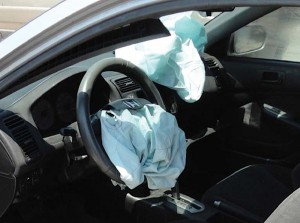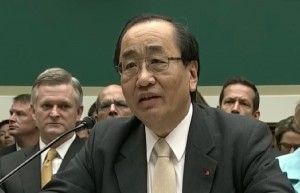Blamed for the largest safety recall in automotive history and facing potentially billions of dollars in legal and repair costs, embattled Japanese supplier Takata is reportedly exploring ways to restructure and bring in new investors.
Industry sources say that without new funding, Takata may no longer be viable. That could leave customers ranging such as General Motors, Daimler and Toyota stuck with the entire bill for replacing tens of millions of faulty airbags. It could also force nearly 20 manufacturers who have used Takata’s suspect airbag inflators to go searching for new sources of replacement parts.
“The committee strongly believes that it is in the best interests of all Takata stakeholders for Takata and its automotive customers to reach a consensual resolution that addresses the costs of the inflator issues while enabling Takata to remain a viable and valued global supplier to the automotive industry,” Hideaki Sudo, a lawyer in Tokyo heading Takata’s new steering committee, said in a statement.
(Toyota recalls another 1.5 mil vehicles with Takata airbags. Click Here for the latest.)
The committee has turned to restructuring firm Lazard for help reforming its operating structure, handling the costs associated with the various recalls and finding new sources of capital. According to various reports from Japan and North America, one of the funds meeting with Takata is Kohlberg Kravis Roberts, or KKR.
Long one of the largest suppliers of automotive airbags, Takata has been the subject of a series of recalls triggered by reports that its devices could malfunction and send shrapnel spewing into a vehicle’s passenger compartment. That problem has been linked to at least 13 deaths worldwide, including 10 in the U.S., as well as more than 100 injuries.
The problem was initially blamed on a manufacturing defect at two North American plants. The Takata bags were believed to be especially sensitive to high heat and humidity affecting vehicles operated in places like Southern Florida and Puerto Rico. But an industry-funded study now says the chemical used to power Takata’s airbag inflators, ammonium nitrate, deteriorates over time and can malfunction in other climates.
The National Highway Traffic Safety Administration last October ordered the recall of 24 million vehicles using Takata airbags. Last month, NHTSA said it would order the recall of as many as 40 million more airbags. Because some vehicles – such as the Toyota RAV4 — use two of the suspect devices, it is not yet clear exactly how many more cars, trucks and crossovers will be impacted.
(Honda earnings take big hit due to Takata recall. Click Here for more.)
What is clear is that Takata is taking a major financial hit. It has already lost a number of customers, including Toyota. And it is on the hook for at least some of the cost of the repairs nearly 20 major manufacturers will have to make.
That left Takata deep in the red during its most recent quarter, with few expecting its financial outlook will improve anytime soon. With investors fleeing, the supplier’s stock has also been hard hit.
Keeping Takata alive could be a challenge, and the major reason Lazard was brought in to help the supplier restructure. According to a statement from Takata, Lazard will “lead its efforts seeking new investment” aimed at addressing “financial and operational issues and to resolve its inflator issues.”
A report on the Reuters news service quoted sources close to Takata saying that KKR is one of “several funds” it is now discussing its options with.
(Automakers under fire for bending the truth about safety, emissions, mileage problems. Click Here for more on the industry’s ethical crisis.)




Two Comments on this one.
First, senior TAKATA engineers knew that ammonium-nitrate-based propellant was risky and the company did it anyway as a cost cutting move. Should have stayed with Tetra Zole. The names? Mark Lillie and chemical engineer Michael Britton. Both spoke before a Senate staff about this.
Second, Takata makes more than air bags. Careful here…they continue to supply a number of manufacturers with other parts. And, they must make the air bag replacements.